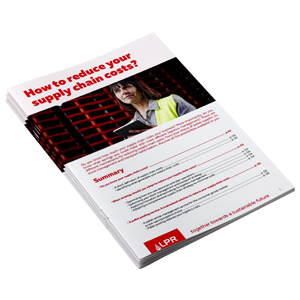Big data has transformed the way businesses carry out daily activities, and the supply chain is no different. Indeed, given its key role and complexity, the supply chain is a great example of a sector that can use big data to great effect. Digital analysis tools can also be used to increase or develop a competitive edge.
Find out how to optimise your data management - and in the process develop a cost effective supply chain!
Greater clarity in your supply chain
Understanding the concepts of supply chain and data
What do we mean by ‘supply chain’ and ‘data’?
- supply chain refers to the physical flows (purchase, transport, storage, delivery, sale, etc.), as well as financial flows (cash in and out of your business), and finally,your data flows - which makes the importance of understanding your data all the more important.
- data is a unit of information. So Big Data refers to large sets of data which are then analysed to provide intelligence to your business activities and decisions.
Data is used in virtually every industry. It enables businesses and organisations to make more informed business and operational decisions. There are many applications ranging from pallet management to order management.
Using supply chain data to be more transparent!
One of the main challenges of data in the supply chain is the processing and integration of large and often poorly understood data, but once analysed, it can provide real benefits across your business. Real-time data processing makes it possible to benefit from greater transparency. Being able to share information between businesses on orders, storage, deliveries, and transport supports smooth running operations.
How many pallets will I need for my delivery? Is my stock of pallets sufficient? The availability of dedicated monitoring tools makes this information, which was once difficult to access, now accessible at a time to suit you.
Regardless of the industry, transparency remains a sensitive issue in any supply chain. Often the lack of transparency is not the issue, more likely it’s that the business doesn’t know how to access the data – or doesn’t have sufficient time or resource to understand it.
Data can be used to optimise delivery routes, maximising efficiency and reducing cost. For example, data will provide the answers to questions such as :
- Where does the pallet journey begin?
- How long does it take to load, route, and unload the pallets?
- What is the delivery route?
All of these answers, and many more, can be identified using data analysis. Additional data sources can also be used to mitigate the impact of issues such as traffic or poor weather conditions, as well as providing insight into improvement opportunities.
Good data management supports great supply chain management
To benefit from a cost effective supply chain, it is important to maintain good levels of data control, not only on processes and operations, but also on goods.
The role of data management in your internal supply chain
When applied to your supply chain management, data makes it possible to identify defective or contaminated pallets or products at source. There may be any number of reasons for the issue you uncover – storage, handling, or delivery, for example. In any event, you maintain the internal control of your logistics management, allowing you to respond quickly and effectively.
Data can also be used to create economic benefits in order optimisation and inventory planning. In fact you can use data analytics throughout the supply chain to plan, forecast and manage your inventory. A definite asset in these volatile times.
Using data in your supply chain is not just about having the right amount of goods or pallets, it’s also about using the technology available to automate your supply chain - so that you can focus your resources elsewhere.
Big data solutions can help strengthen and facilitate the digitisation of inventory management, offering real-time monitoring, allowing you sufficient time to respond to environmental impacts on your business. Support your supply chain through an optimised data system which helps you to properly understand and control your long term business evolution.
Data management supports your external supply chain too!
As well as being able to use the data you gather to improve your own business, you can also use it for the benefit of your business partners too – in fact any one of your supply chain partners. Sharing data allows you to see where goods came from, the onward journey – and their final destination.
Using big data solutions you can combine and structure data which impacts your business, allowing greater logistics management and enhanced control. Automating these actions will limit resource drain on your business promoting the economic efficiency of your supply chain.
Using data to benefit your supply chain – in five easy steps
- Gather your data.
- Integrate this data, into your system.
- Consider which elements of the data are most useful to you and your business.
- Decide how you want to use and share the data.
- Regularly review the effectiveness and quality of the data to ensure that it is still adding value.
Using your supply chain data in pallet pooling.
By understanding your data sets, you can identify where efficiencies and savings can be made in your supply chain. You can use this data to review the journey your product makes and how long it spends at each stop.
Data helps optimise your logistics management and can provide the basis for a successful move to pallet pooling. LPR understands the need to easily manage your flows - and your data – without hassle and has developed a specific web portal, MyLPR, to allow you to simply place your orders, provides access to your invoices and reports at a time to suit you


